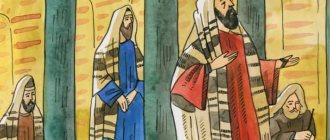What does the commandment “the meek shall inherit the earth” mean?
"...for they will inherit the earth"
God exists for life with God
Are you impatient, bossy, hot-tempered? Then listen to Jesus: “Blessed are the meek, for they will inherit the earth” (Matthew 5:5).
The world places little value on gentleness and meekness. The worldly beatitudes are closer to the following formulations: “Blessed are those who assert themselves, for they will achieve their goal”; “Blessed are those who advertise themselves, for they will be noticed”; “Blessed are the assertive, for they will prosper.” Yet Jesus said, “Blessed are the meek, for they will inherit the earth.”
The last part of this promise—“they shall inherit the earth”—fires the imagination and generates much controversy. What did Jesus mean when he said that the meek will inherit the earth? And how are meekness and happiness related?
Jesus said that those who have this quality are “blessed.” How is meekness related to happiness? As with the previous beatitudes, gentleness in itself contributes to true happiness - because a gentle, meek person thinks more about the needs of other people than about his own. Therefore, unlike most people in the world, he is not filled with frustration that others do not meet his needs. However, the main emphasis in our text is again on the fact that happiness is in the promise.
The promise in Matt. 5:5 is amazing: “Blessed are the meek, for they will inherit the earth.” What does it mean? In what sense do the meek “shall inherit the earth”?
What this promise doesn't mean
This promise does not mean that the meek will inherit the earth in a legal sense. Consider the two examples of meekness we discussed: Moses and Jesus. McCord writes: “If anyone thinks that Jesus meant this land literally, then the meekest man of all has not received what he was promised. Moses had no home and wandered for forty years in the hope of inheriting the promised land, but only looked at it from afar (Deut. 34:1-5). The Bible also tells us that Jesus was meek, but He was far from literally inheriting the earth. Jesus said, “Foxes have holes, and birds of the air have nests, but the Son of Man has nowhere to lay his head” (Luke 9:58).
However, I have letters and articles in my files in which people claim that Christians will one day have legal rights to physical land. Their favorite text is Matt. 5:5: “Blessed are the meek, for they will inherit the earth.” For example, there are premillennialists who include this promise in their doomsday scenario. They say that Jesus will return to earth and literally reign for a thousand years. And during this time, they claim, God's children will inherit the earth.
And then there are those who teach that only 144,000 will go to heaven, and the rest of God's people will live on earth forever. Two adherents of this theory one day knocked on my door. They began to say that the earth would be cleansed of sin and evil, disease and death would disappear on it, and there would be complete happiness. “Isn’t it wonderful?” - they asked. “Actually, no,” I replied. - After all, I was looking forward to a new heaven and a new earth (2 Pet. 3:13; see Rev. 21:1), and all that you promise me is a patched up, repaired earth. Even a child knows the difference between new and patched clothes.”
The Bible does not teach that the meek will inherit the earth, having received it as legal property now, nor that they will receive it in this sense later. Peter wrote: “The day of the Lord will come like a thief in the night, and then the heavens will pass away with a noise, and the elements will be destroyed with burning fire, and the earth and all the works that are in it will be burned up” (2 Pet. 3:10).
What does this promise mean?
What then does this promise mean? In what sense will the meek inherit the earth? As with the promises already discussed, this promise is not physical in nature, but spiritual. Jesus' disciples hoped that the Messiah would be a military leader who would conquer the land and then give it to them to rule over. Jesus dispelled these hopes by saying, “My kingdom is not of this world” (John 18:36).
However, even if we agree that this promise is spiritual, this still does not clarify the question of whether the “earth” in our text refers to this life or the next. Some insist that the promise applies only to this life. Others just as stubbornly argue that it cannot refer to this life, and therefore must speak of the life to come. Let me once again express the idea that this promise has a twofold fulfillment: partial in this life and complete in the next.
In this life. In the Old Testament, David speaks almost the same words as Jesus in Matt. 5:5: “But the meek will inherit the earth and enjoy much peace” (Ps. 36:11). In Ps. 36 The meek are those who trust in the Lord (v. 3) and who patiently wait for Him to punish those who do evil (vv. 7–9). However, for us the word “earth” is of greatest interest. The “land” in the psalm is the geographic area known as the land of Canaan. Only the humble and meek, David argued, would enjoy the blessings of this land. In the same way, I believe that only the meek can fully enjoy the blessings of this earth on which they now live.
Only a meek Christian will inherit the earth, “in the sense of inheriting the richest, fullest and most intense life that this earth can give” (Schubert). Paul was talking about just such a life when he wrote about himself: “...we have nothing, but we possess everything” (2 Cor. 6:10). He assured the Corinthians: “...for all is yours, whether Paul, or Apollos, or Cephas, or the world, or life, or death, or the present, or the future, all are yours; But you are Christ’s, and Christ is God’s” (1 Cor. 3:21–23). “Everything of value in this world belongs to the meek. Legally, they may not personally own an inch of land, but they understand that all land belongs to Yahweh and they can enjoy all its beauty and splendor” (Tall).
Shortly before my first sermon on the Beatitudes, I attended the funeral of a church member in Comanche, Oklahoma, Jewel Thomas. He was a humble man, a farmer. Farewell to him took place in the large assembly hall of the high school. All the chairs were occupied and people were standing along the walls. One of the texts read during the service was Matt. 5:5: “Blessed are the meek, for they will inherit the earth.” Then for the first time this text acquired a special meaning for me. Brother Thomas was not rich, but he inherited the true blessings of this life, including the respect of the entire community. George MacDonald wrote: “Who is the greatest owner in the world, the one who has a thousand houses, or the one who has not a single house in his own possession, but has ten houses, at the knocking of whose doors he will be greeted with wild joy? Who is richer - the one who, if his huge money disappeared, would not find shelter for himself, or the one for whose needs hundreds would sacrifice their comfort?
Many of us probably know very rich but unhappy people, as well as poor but happy people. It is not a great fortune that makes us happy, but an attitude towards life. Don Humphrey o. And that a meek person is not burdened with property and is not afraid of losing it.
In the life to come. Much more can be said about the meek inheriting the best of this life, but let us turn to the life to come. As with all the Beatitudes, the full fulfillment of this promise will be in heaven. In Heb. 11 we read about the heroes of the faith: “They all died in faith, not having received the fulfillment of the promises, but only saw them from afar, and rejoiced, and said about themselves that they were strangers and strangers on earth; for those who say so show that they are looking for the fatherland. And if they had in their thoughts the fatherland from which they came, they would have time to return; but they strove for the best, that is, for the heavenly. Therefore God is not ashamed of them, calling Himself their God: for He has prepared a city for them” (vv. 13-16).
Two chapters later, the author will say, “For we have no permanent city here, but we are seeking the future [that is, in heaven]” (13:14; see Rev. 21:2, 10).
To Rome. 8 Paul wrote about our spiritual heritage. He said that we are “heirs of God and joint heirs with Christ, if only we suffer with Him, that we may also be glorified with Him” (v. 17). He understood that our blessings in this life would always be mixed with suffering, and therefore he looked forward to the life to come with hope. He continued, “For I consider that the sufferings of this present time are not worth comparing with the glory that will be revealed in us” (v. 18). At the end of his life, he wrote: “And the Lord will deliver me from every evil deed, and will preserve me for His Heavenly Kingdom. To him be glory forever and ever. Amen” (2 Tim. 4:18).
The full and final fulfillment of the promise “they will inherit the earth” will occur when we see “new heavens and a new earth” (Rev. 21:1; see 2 Pet. 3:13), the dwelling of God Himself in heaven. There is no greater incentive to strive to be what we should be.
“Blessed are the meek, for they will inherit the earth” (Matthew 5:5). Do you want to “inherit” the earth—enjoy the best that the earth has to offer and look forward to a “new earth”? Then you must be meek.
Remember that gentleness is more than just a soft voice and a kind attitude towards others. Some consider this beatitude to be the most difficult because it requires complete submission to God's will. A proud man says to God: “I don’t need You or Your way.” And the meek one says this: “God, I recognize my weakness and understand that I have nothing valuable to offer You, but I am grateful that You love me and have made the path to salvation clear. And I humbly submit to Your will.” If you are not a child of God or an unfaithful child, show humility and come to the Lord today.
facebook.com
St. Petersburg Church of Christ
Seeing the people, He went up the mountain; and when he sat down, his disciples came to him. And He opened His mouth and taught them, saying: Blessed are the poor in spirit, for theirs is the Kingdom of Heaven. Blessed are those who mourn, for they will be comforted. Blessed are the meek, for they will inherit the earth. (Matthew 5:1-5)
All the beatitudes are categorically opposite to what man thinks about today. The world thinks about expressing itself through strength, power, acquaintances, self-affirmation.
But Christ was different from all the teachers of that time. He brought us not just knowledge about the external, or how everything works. He told us how to find peace with God.
What is the calling and purpose of man on earth?
In relation to God, the most important goal of man is the constant glorification of His Holy Name.
For you were bought at a price. Therefore glorify God both in your bodies and in your souls, which are God's. (1 Cor. 6:20)
So whether you eat, drink, or whatever you do, do everything for the glory of God. (1 Cor.10:31)
Our desire to please God is like a child’s desire to bring joy to his parents.
Unfortunately, we see that people need a lot from God, but not God himself.
In relation to yourself, it is important to constantly develop and improve your inner man. The human soul is a great treasure with rich, latent spiritual energy that must be increasingly sanctified by the Holy Spirit. The talents that the Lord gave to man must be used by him to develop the natural resources of the earth, spiritualize matter and the environment. In a word, man is called to work on himself and around himself.
We lost something in ourselves when we lost our relationship with God. The Beatitudes help us regain within ourselves that which develops and perfects us. Created “in the image and likeness of God,” man is called upon to contribute to all genuine progress and improvement in every area of life. A person is also an intermediary of the benefits that the Lord has given him to carry out the work entrusted to him. All of humanity in God's plan is one great family, where, imitating Christ, everyone must work for the good of the other.
Sermon on the Mount
The Beatitudes call us to understand our own weakness and poverty. They confront us with the need to see God not only in the Ten Commandments of Moses, but to live more powerfully as Christ.
The 10 commandments of Moses are limited to the fact that they prohibit doing what is sinful and command certain priorities.
The Beatitudes of Christ teach how Christian perfection or holiness can be achieved. They are about the state of the heart. Holiness is the highest happiness - the bliss that a person can desire.
The question is not “what to do?”, but “what should we be?” If someone thinks that he can live a Christian life on his own, with his own capabilities, knowledge, he shows that he is still an immature follower of Christ.
Every Christian, regardless of character and upbringing, should be meek. And this quality is the result of the new human nature.
Meekness is not weak, timid, insecure, inactive, lethargic, unable to react to acute moments.
Meekness is not flexibility, sentimentality, it is not peace at any cost.
Meekness is not something we are born with, it is a choice of our hearts because of boldness in Christ.
Examples of meek people from the Bible:
Moses is the meekest man. He led a million Jews out of Egypt. He grew up at the palace, like the son of a pharaoh. Do you think he could conquer and subjugate?
David was anointed to the Kingdom, but meekly waited for his time. He endured the injustices of King Saul with patience.
A good example is Saul (Paul). You would get it from him: it doesn’t matter whether you are Orthodox, Catholic or Protestant - for him you are a sectarian who follows Jesus. He eventually put aside his knowledge of the Law and allowed Jesus to change his mind, and then all his strength and skills served the Church of Christ.
Jesus endured and blessed.
Come to Me, all you who labor and are heavy laden, and I will give you rest; take My yoke upon you and learn from Me, for I am meek and lowly in heart, and you will find rest for your souls. (Matthew 11:28-29)
Ethical virtues are considered to be the mean between two extremes. For example, courage is the mean between reckless courage and cowardice, generosity is between stinginess and wastefulness, meekness is between hot temper and inability to be justly angry. (Aristotle)
If we ask when it is okay to be angry and when it is not okay, we can suggest as a general rule that we should never get angry or angry because of insults or wrongs done to us personally. A Christian should not be angry about this. However, a person has the right to be indignant when insults are caused to other people. Selfish anger is always a sin, and selfless anger can be one of the greatest moral motivators in the world.
The biggest mistake Christians make is when they think that they are nobody and nothing. Yes, God calls such people, but transforms them into strong personalities who can change the world.
To be meek is to be calm when everything is stormy.
He who is patient is better than the brave, and he who controls himself is better than the conqueror of a city. (Proverbs 16:32)
The word PRAUTES (gentleness) - denoted domestic animals that learned to live under control, became domesticated. Isn't a dog fearless? Isn't the bull strong? Can't a horse run away from me quickly? They were taught obedience, and this separated them from other animals.
Meekness is strength under control, strength under God's control. A person who trusts that God is in control of everything is in no hurry to take revenge or show his strength. Peace in the heart from God consoles and makes him courageous.
Meek - having a correct view of oneself. Respecting both himself and the people around him. He will not boast, brag, or assert himself against the background of others. If Christ wanted to assert himself against our background, He would have learned well from Him. But He said: “I am meek and humble in spirit” (Matthew 11:29).
Let your actions speak for you, not your connections, appearance, past.
The meek knows that he is poor in spirit and without God - nothing and in need of the Kingdom of God.
The first step in acquiring any knowledge is the realization that I don’t know something.
We do not need much knowledge; we are driven by the awareness of growing and strengthening in Christ.
The Roman teacher of rhetoric, Quartilian, said: “They could be excellent students if they were not completely convinced that they already know everything.”
So, a Christian is a new creation. His attitude is new. He belongs to a completely different Kingdom.
Therefore, if anyone is in Christ, he is a new creation; the ancient has passed away, now everything is new. (2 Cor. 5:17)
Ancient - ἀρχαῖος. The primordial, primary, initial - has passed. You cannot come to God on your own terms.
Are we really ready for this?
So, He belongs to a completely different Kingdom!
"...will inherit the earth"
At that time, Judea was under occupation by the Roman Empire. They prayed to God for freedom and independence, political freedom from Rome, as it was under David and Solomon. They prayed for the restoration of full and real service in the temple and for a King from the line of David. Their Messiah will bring them the long-awaited freedom and victory of Judaism and the Great One God over everyone and the establishment of His power on earth! The Jews did not have their own land for a long time, they got it with difficulty, were driven away, then returned, then occupied.
Jesus disappoints them. And the palm branches give way to cries of “Crucify him!” And His sermons are not a call for revolution, but a call for meekness.
But the meek will inherit the earth and enjoy much peace. (Ps. 36:11)
They were in their land, but had no peace in it. How it made them nervous.
They “will inherit the land” - a paraphrase of the entire Deuteronomy, in which the inheritance of Palestine, as the promised land, is assigned by God only to people who morally deserve a reward from God, to the righteous.
"They will inherit the earth."
This land is not taken by force, cunning, deceit, or authority. This land is a legacy.
Have you entered into a legacy? Not to have - but suddenly to become the owner. This beckons, scammers make money from this - they send letters from a lawyer from South Africa about what your namesake has ordered to find in Russia after the death of the heir to a multimillion-dollar property. And so he gives you hope, what if it’s you?
Christians do not speculate on what they do not know. We were not in that land. We ourselves pray to get there and not lose anyone. Neither myself nor my family.
Inherit the land and constantly fear that you will be driven away. Even today, borders are moving. By force or politics. You receive a document for property, but circumstances come above you, and you and your paper are nothing. In our civilized Europe this happened several times in the last century.
If promises can be easily taken away, then there is little value.
And then I saw a new heaven and a new earth, for the old heaven and earth had disappeared, and the sea no longer existed. I also saw the holy city, the new Jerusalem, descending from God from heaven and adorned like a newlywed bride dressed for her husband. And I heard a loud voice coming from the throne: “Look, God’s dwelling place is now among people. He will now dwell among them, and they will be His people, and He will be their God. He will dry the tears from their eyes and there will be no more death. There will be no more sorrow, no more grief, no more pain, for everything old has disappeared.” And then the One sitting on the throne said: ... He who wins will inherit all this. I will be his God, he will be My son." (Rev. 21:1-7)
If you look closely at the Sermon on the Mount and the promises made at the end of John's book of Revelation, you will see similarities.
So, strength clothed in meekness, trust in God.
…learn from Me, for I am gentle and lowly in heart, and you will find rest for your souls (Matthew 11:29)
This power is sealed within a person for proper use. God doesn't want us to be weak, He wants us to be meek.
The Bible teaches that this is one of the keys to reducing tension in your life.
It is allowing God to be God in your life.
Vitaly Logunov
Published February 4, 2022
Other Bible Lessons
Gospel according to Matthew 5:5
Blessed are the meek for they will inherit the earth
Those ascending some ladder, when they stand on the first step, rise from it to the one lying above, and the second again leads the ascendant to the third, and this one to the next, and this next one to the one behind it; and thus, the one who ascends from the level on which he stands always rises to the highest, and reaches the very top of his ascent. What do I mean by this, with this I begin my speech? It seems to me that a series of beatitudes are arranged like steps, making it convenient in words to ascend from one beatitude to another. For the one who has ascended with his understanding to the first bliss, according to some necessary sequence of thoughts, accepts what follows; although the word, apparently, at first glance represents something strange.
The listener will say, perhaps, if you follow the arrangement of the steps, then it is impossible to receive the inheritance of the earth after the Kingdom of Heaven. On the contrary, if the word were to follow the nature of things, then it would be more consistent to mention the earth before heaven, since from it our ascent to heaven will begin. But if we are inspired by a few words, and stand on the very ridge of the vault of heaven; then we will find there the heavenly land, prepared as an inheritance for those who lived virtuously; so that there will be no error in the order of the beatitudes, according to which in God's promises they are offered to us, first heaven, and then earth. For the visible sky, as far as the bodily sense is concerned, is akin to itself in everything; and although it appears, by local distance, to be high; however, it is lower than the spiritual essence, to which the thought cannot ascend without first passing through the mind what the feeling touches. If the highest lot is called earth, then do not be at all surprised at this: because the Word descends to the lowness of our hearing, and it descended to us because we were not able to rise to Him. Therefore, with sayings and words familiar to us, It conveys the Divine secrets, using such words that custom retains in human life. For in the previous promise, the ineffable bliss in heaven was called a kingdom, perhaps indicating by this name something similar to what happens in the kingdom below, for example, some crowns shining with the brilliance of stones, colored crimson, sparkling with something delightful for greedy eyes , vestibules and curtains, elevated seats, rows of decorously standing spearmen, and everything else that is put on display in such a disgrace of life, trying with such things to raise the greatness of power even higher? But since the name of the kingdom, in relation to this life, is something great and almost above everything desired for people; That is why the Word used this name to mean the highest good; so that if people had something else of a higher kingdom, then, of course, the Word, by naming it, would inspire the soul of the listener to desire ineffable bliss. For it was impossible to reveal to people these benefits, which are higher than human feelings and knowledge, and it was impossible under their own names. It is said: eye does not see, and ear does not hear, and the heart of man does not sigh (1 Cor. 2:9). But so that the hoped-for bliss does not remain completely distant from our fortune-telling, as much as we embrace in the baseness of our nature, we hear so much of the inexplicable.
Therefore, do not let the similarity of the earth lead your understanding after heaven to the earth below; but if from the first bliss you have risen in mind and ascended to heavenly hope; then extend your love to that land, which is not the common heritage of all, but only for the meekness of life of those recognized as worthy of this promise. This is what, it seems to me, the great David, about whom the Divine Scripture testifies that he was meek and gentle more than all those who lived in the world in his time, was guided by the spirit and saw through faith, and already had what was hoped for by faith, saying: I believe to see good things in the lands of the living (Ps. 27:13). For I do not believe that the Prophet called this land of the living a land that brings back everything mortal and again resolves into itself every generation from it. On the contrary, he knew the land of the living, into which death did not enter, on which the path of sinners was not trampled, which did not bear the trace of vice, which the sower of tares did not cut with the plow of guile, which does not produce thistles and thorns, on which is the water of rest, and the place grain, and a source divided into four streams, and grapes cultivated by the God of all, and everything else that we hear mysteriously expressed in the inspired teaching. If we truly mean this high land, imagined above the heavens, on which the city of the great King is inhabited (Ps. 47:3), about which the glorious words were spoken, as the Prophet says (Ps. 87:3), then it would not be fair to find it strange order of the sequence of beatitudes. Otherwise, it would not be likely, as I think, that this land of blessing would be given to the hope of those who, as the Apostle says, will be caught up in the clouds through the air to meet the Lord, and so will always be with the Lord. For what other need is there for those who have the highest hope of life in the land below? We will be caught up into the clouds to meet the Lord in the air, and so we will always be with the Lord (1 Thess. 4:17).
But let's see what kind of virtue the inheritance of this land is intended as a reward for. It is said: Blessed are the meek: for these shall inherit the earth . What is meekness? And why does the Word please meekness? In my opinion, everything that is done with meekness should not be equally considered a virtue, especially if the word only denotes quietness and slowness. In fast walkers, the quiet one is no better than the hasty one; and in hand-to-hand combat, it is not the one who moves with difficulty who takes the crown from the enemy; and if we are heading towards the honor of a high calling (Phil. 3:14), then Paul advises us to increase our speed, saying: so strive that you may comprehend (1 Cor. 9:24), because he himself, with an always intensified movement, strived forward, betraying back oblivion; and was agile in hand-to-hand combat. For he looked out for the enemy’s readiness to attack, stepped with a reliable foot, had armed hands, did not throw the weapon from his hands into something empty and untenable, but touched with it the most essential parts of the opponent, striking the body itself. Do you want to know Pavlovo's art in battle? Look at the wounds of the one who fights him; look at your opponent's black eyes; look at the marks of sores on the vanquished. Without a doubt, the enemy is not unknown to you, fighting against him with the help of the flesh, whose eyes he blackens, tearing with the nails of abstinence, whose members he kills with hunger, thirst, cold, on whom he imposes the plagues of the Lord, whom he defeats, leaving behind him in the run, so as not to darken your gaze if the enemy runs ahead. So, if Paul is quick and swift in his exploits; then David, attacking his enemies, widens his feet (Ps. 17:37-38), and the Bridegroom in the Song, in terms of mobility, is likened to a roe, galloping over the mountains and leaping over the hills (Song. 2:8). Many similar examples can be cited, from which it turns out that speed in motion is preferable to quietness. So why does the Word here, in the form of prosperity, please meekness? For it is said: blessed are the meek: for these will inherit the earth , without a doubt, this earth, fruitful with beautiful offspring, adorned with the tree of life, watered by springs of spiritual gifts, on which grows the true Vine, the worker of which, as we hear. Father of the Lord (John 15:1)?
But the Word seems to be saying something similar to the following: there are many conveniences for vice, nature is very rapidly for the worse; like heavy bodies, although they are completely motionless upward, but if they are pushed along the slope from some high peak, they rush down with such swiftness, increasing the desire with their own weight, that the speed exceeds the measure. So, since speed in the pursuit of vice is harmful; then, without a doubt, what is represented by the opposite will be worthy of satisfaction. And this is quietness - the skill of being slow and motionless in such impulses of nature. For, like fire, having the property of always moving upward, it is motionless in the opposite direction; Likewise, virtue, being fast-moving towards the higher and higher, and never abandoning its speed, is not allowed to find an opposite desire. And therefore, since in our nature there is an abundance of haste towards evil; then quietness in bad deeds is greatly gratified. For it is not activity in this that serves as evidence of movement towards the heavenly.
But it would be better to explain this teaching with the most examples borrowed from life. The movement of every will is twofold, because of freedom it rushes towards what seems best, here towards chastity, and there towards lewdness. But what is said about the particular type of virtue and vice, then understand about the whole. For human character is necessarily divided in opposite directions; irritability is contrasted with gentleness of character, arrogance with modesty, hatred with benevolence, hostility with love and a peaceful disposition. So, since human life is material, and passions are due to substances, every passion has a quick and uncontrollable impulse towards the fulfillment of desire (because matter is heavy and tends downward); then the Lord, therefore, does not please those who live outside the influence of passions on them (in material life it is impossible to completely succeed in an immaterial and dispassionate life); but he calls meekness the possible limit of virtue in human life, and says that being meek is enough for bliss. For human nature does not legitimize perfect dispassion; It is not the nature of a truthful Lawgiver to command what nature does not accept. Such a command would be likened to the order of someone who would move those living in the water to live in the air, or, conversely, everything that lives in the air - into the water. On the contrary, the law must be applied to the inherent and natural force. Therefore, this blessedness commands moderation and meekness, and not complete dispassion; because the latter is outside of nature, and virtue thrives in the former. Therefore, if bliss presupposed immobility towards desire, then this blessing would be useless and serve no purpose in life. For who, connected with flesh and blood, would achieve such a thing? Now it is said that it is not the one who lusts for some reason who is condemned, but the one who, by design, attracts passion to himself. That such a desire sometimes occurs is often brought to this point, even against our will, by weakness associated with our nature; but not to be carried away, like a stream, by the swiftness of passions, but to courageously resist such a disposition and reflect the passion with reason - this is a virtuous matter.
Therefore, blessed are those who do not suddenly indulge in passionate movements of the soul, but are restrained by reason - those whose thoughts, like some kind of bridle, stop the impulses and do not allow the soul to go into disorder. It is better to say something similar to this, namely, that meekness is worthy of gratification, can be seen by anyone in the passion of irritation. For as soon as a word, or some deed, or the suggestion of some kind of trouble, arouses such a disease, the blood in the heart boils, and the soul is ready to move towards vengeance; and just as, according to legend, other drugs change our nature into the image of dumb animals, so then a person, out of irritation, suddenly becomes a boar, or a dog, or a leopard, or some other similar animal; he has bloodshot eyes, standing on end and bristling hair, a stern voice, cutting speech, a tongue numb with passion and unable to serve internal impulses, lips that do not move, do not utter words, do not retain the moisture in his mouth affected by passion, but is ugly along with the sound spitting out this foam, and such are the hands, such are the legs, such is the entire structure of the body, each member corresponds to passion. Therefore, if such is the irritated one; and he who means bliss, with the help of reason, tames the disease, and expresses this with a calm look and a quiet voice, like some doctor who, with his art, heals those who are maddened to the point of disgrace; then wouldn’t you say yourself, comparing one with the other, that this beast is pitiful and vile; But the meek one is worthy of praise, who even the malice of his neighbor has not forced him to lose his good looks?
And that the Word has this passion in mind especially, is clear from the fact that after humility, meekness legitimizes us; because it is natural to hold on to one another, and the state of humility to be like a mother of some kind of meek skill. For if you destroy arrogance in your character, then there will be no time for the passions of irritation to arise; because the cause of such illness in those who are irritated is resentment and dishonor. Dishonor does not concern the one who has taught himself humility. If anyone’s thoughts are pure from human deception, and he sees the insignificance of nature, which is given to him as an inheritance, also what is the beginning of its composition, and to what end does the brevity and transience of this life tend, he sees the impurity associated with the flesh, and the poverty of nature, which in itself would not be enough to maintain its own composition, if its shortcomings were not made up for by the abundance of dumb people, and on top of this, he sees sorrows, sorrows, disasters and various types of diseases to which human life is subject, and from which no one is exempted and free from nature: then one who carefully peers into this with the pure eye of the soul will not easily be indignant at the shortcomings of the honors bestowed upon him. On the contrary, he will deceive the honor shown to him by his neighbors. because there is nothing in our nature that can stand among honorable things, except only the soul, whose honor is not something sought in this world. For to be vain of wealth, or to boast of one’s family, or to dream of glory, or to mentally arrogate to oneself superiority over one’s neighbor, to which human honors are limited, all this serves to shame and reproach the soul, so that a reasonable person will not agree to defile the purity of the soul with anything like this. To behave this way means nothing more than to be deeply rooted in humility, after success in which, irritation will not even have entry into the soul. And when there is no irritation, a quiet and silent life succeeds (1 Tim. 2:2); This to a woman is nothing else but meekness, by which the end of the blessedness and inheritance of the heavenly earth in Christ Jesus our Lord. To him be glory and power forever! Amen.
About the Beatitudes. Word 2.
Psalm 36
One of the striking features of Psalm 36 is the fact that it forms the Old Testament basis for one of the beautiful sayings of Jesus, which He quotes from this Psalm. “But the meek will inherit the earth and enjoy much peace” (36:11). It is worth considering how literally this promise will be fulfilled, and thus how real it must be to us.
The word "inheritance" appears six times in this Psalm; five times it has the connotation of a legal inheritance, and once (another Hebrew word is used, v. 18) the connotation of "property." The heirs of this promise will literally become heirs in the sense of possessing the land. Note also that the Hebrew word for “earth” in Psalm 36 is the familiar word eretz, which can mean either earth or dry land. In the first sense, it is often used as the land (country) of Israel, which is located in modern Israel. From this it is quite clear that this is a very real promise, relating primarily to Israel.
In other words, this promise has its roots in the promises made to the patriarchs. The land of Israel was promised to Abraham. “For all the land that you see will I give to you and to your descendants forever” (Genesis 13:15). “On this day the Lord made a covenant with Abraham, saying, “To your descendants I will give this land, from the river of Egypt to the great river, the river Euphrates” (Genesis 15:18). The literalness of this promise is reinforced by the definition of the boundaries of the promised land. But we must remember that this land was originally promised not to Abraham, but to his seed - the Lord Jesus Christ. “And the Lord appeared to Abraham and said: “To your descendants I will give this land. And he built there an altar to the Lord” (Genesis 12:7). Jesus will inherit not only the land of Israel, but the whole earth, for He is the King of kings and Lord of lords. “He will rule from sea to sea and from the river (Euphrates) to the ends of the earth” (Psalm 71:8). This teaches us that the kingdom of Israel, restored by Christ as king, will be the center of a worldwide empire or community of nations. Not only that, but those who are true followers of Christ through faith in these promises will also inherit what was promised, not just the Promised Land, but the whole earth and the government of it. Paul tells us this directly: “For the promise was not given by law to Abraham, or to his seed, to be heirs of the world, but through the righteousness of faith” (Romans 4:13). Therefore, if we have faith in these promises, our faith will be counted towards us as righteousness on the Day of Judgment, and we will inherit the whole earth and will live and rule with the Master and enjoy peace and quiet.
As wonderful as these hopes and promises are, we know quite well that believing them does not come easily or overnight. David recognized this when he spoke of waiting and being patient during the fulfillment of the promise of the inheritance. A true appreciation of it should make us want to make it a reality as soon as possible. However, for the vast majority of saints who have ever lived on earth, this patient waiting throughout their mortal life ended with death, with this inevitable grim reality. However, “those who do evil will be destroyed, but those who trust in the Lord will inherit the earth” (36:9). “Trust in the Lord, and keep to His way: and He will exalt you to inherit the earth; and when the wicked are destroyed, you will see” (36:34). The promise will be fulfilled, but for now we must wait, trusting in the Lord and understanding that He has His own schedule regarding earthly affairs.
Note that the Hebrew word for “wait” also has the connotation of “to look forward to.” Waiting on the Lord involves sincerity and faith in the fulfillment of His promises. Waiting is sometimes not easy and sometimes involves enduring hardships and suffering. David exhorts us by the Spirit to wait with patience, and the Hebrew word “patiently” actually has the connotation of “pain, torment, ordeal.” “Submit to the Lord and trust in Him. Do not be jealous of him who prospers in his way, a wicked man” (36:7). Therefore, the wait can be and often is filled with agony, but our faith should not be diminished by this. The promises are very real and will be fulfilled exactly and literally in due time.
One of the injustices that believers face as they await the inheritance of the earth with the seed of Abraham is that very often the wicked prosper rather than the righteous. This in itself is a test of faith and character. We are repeatedly admonished not to agonize over this problem. Verse 7 above also contains this idea, which is repeated throughout the Psalm. “Do not be jealous of evildoers, do not envy those who do iniquity... cease to be angry, and forsake rage; do not be jealous to the point of doing evil” (36:1,8). The Hebrew word translated "jealous" contains the idea of "being hot, excited, angry and mad." This reaction to the prosperity of the wicked, which sometimes occurs at the expense of the righteous, is understandable. But they are equally aimless and, moreover, contain a grain of mistrust that one day God will completely destroy both the wicked themselves and their wealth. They will never inherit the earth and will not live forever. “For they will quickly be cut down like grass, and wither like green grass... the wicked will perish, and the enemies of the Lord will disappear like the fat of lambs, vanishing in smoke” (36:2,20). The more we appreciate and recognize the righteousness of God, the more we should be indignant at the prosperity of the wicked. For example, the fact that homosexuality in our time is completely tolerated by society and is even advertised should fill the hearts of the saints with anger and sincere rejection of this phenomenon. But we must not wave our fists; instead, we must patiently await the Lord's retribution. “Not yet many, and the wicked will not be; You will look at its place, and it is not there” (36:10).
Verse 20 is interesting in this regard. The language of the burnt offering offered under the Law is taken into account to describe the destruction of the wicked. Although the sacrifice was supposed to be clean, both inside and out, and without blemish, the lesson of its burning was that the victim's flesh was completely destroyed. The wicked are carnal people. When the judgments of God come, they will be destroyed in exactly the same way as the flesh of the victim was destroyed in the fire burning on the altar.
Isaiah describes God's judgment on Edom in language that is heard throughout Scripture, and this pattern will be repeated on a much larger scale when Christ and the saints carry out God's judgments on His enemies during their march from Sinai to Zion. “The sword of the Lord shall be filled with blood, made fat with fatness, with the blood of lambs and goats… for the sacrifice of the Lord is in Bozrah, and a great slaughter in the land of Edom… for the day of vengeance is of the Lord, the year of retribution for Zion” (Isaiah 34:6,8).
While we patiently await the coming of our Lord, we must do our best to develop in ourselves those elements of character that will be pleasing to the Father on the Day of Judgment. The promise of the inheritance of the earth is repeated seven times in our Psalm (vv. 3, 9, 11, 18, 22, 29 and 34). Surely the number itself is significant, pointing to heavenly perfection in this repetition of glorious promises. We need to look carefully at these verses and look for characteristics associated with waiting for the promises to be fulfilled.
1) Trust in the Lord (v. 3); 2) the same (v. 9); 3) meekness (v. 11); 4) integrity (v. 18); 5) His blessing (v. 22); 6) righteousness (v. 29); 7) keeping His ways (v. 34).
These are the character traits that we must develop in ourselves. The standard is high and demanding, but on the other hand, God's commandments are not so difficult. Righteousness comes with faith, not with ideal humility, which we can never achieve. Jesus himself summed up these characteristics when he said, “Blessed are the meek, for they will inherit the earth” (Matthew 5:5). Meekness before the Almighty includes faith in His promises, patient waiting for the fulfillment of His plans, righteousness, integrity, and following His way as stated in His Word, while seeking His blessings daily in prayer. All of this involves submission to His will and trust in His Word, which requires the fundamental foundation of meekness.
The concept of trusting God is emphasized in verse five: “Commit your way to the Lord, and trust in Him, and He will bring it to pass.” The Hebrew word for “deliver” literally means “to roll” and comes from the word galal. In the vast majority of cases it is translated as “to trust.” Literally it is used to depict a rolling stone or a stone rolling away from the mouth of a cave or well. Metaphorically, it means complete dependence on someone else's support, usually God's. The result of this complete trust in faith in God is that something rolls away from us, i.e. gets out of the way; the shame and shame of sin and our sinful nature is removed from us. We find a similar translation of this Hebrew word in Psalm 119:22: “Take away from me reproach and shame, for I keep Your testimonies.” This is achieved in the forgiveness of sins, which is offered to all who seek victory over their flesh and have faith in the victory over sin achieved by Jesus. For Israel, this victory is sealed in the ritual of circumcision. Interesting fact: the generation that entered the land (figuratively into the Kingdom) performed this ritual at Gilgal, which in Hebrew is related to the word galal and means “to roll back, to set free.”
This reminds us how the shame and guilt of sin is taken away from us; it is accomplished for those who are in Christ through His work. “For zeal for Your house consumes me, and the reproaches of those who slander You come upon me” (Psalm 68:10). Turning our attention now to Christ, turning to the symbols, we must pay close attention to the advice of the Psalm analyzed today: “Keep an eye on the blameless, and look on the righteous; for the future of such a person is the world” (36:37). In all of history there was only one “blameless” one – the Lord Jesus Christ. His end is true peace and in Him we too can not only strive, but ultimately find this peace when we enter through faith into our inheritance. In the meantime, brothers and sisters, do not lose heart, but commit yourselves to the Lord, knowing that the wicked will be destroyed on the day of God’s vengeance, and then those who are found meek, together with Abraham, will become heirs of the world. “But the meek will inherit the earth and enjoy much peace.”
Richard Melloves (01/20/2002)
The Beatitudes. Interpretation
You are talking about the Sermon on the Mount of Jesus Christ. He begins it with the Beatitudes.
Here is an excerpt from my book, “Returning to the Origins of Christian Doctrine,” which discusses the word “blessed”:
«
The verb to please in the original is represented by the Greek word makarizo *, which has the translation “to consider (call) blessed.” This word is derived from makario*, meaning “blessed, happy.” The Bible calls a happy person blessed, although Russian-speaking people have other associations with this word:
“Blessed is the man who fears the Lord and firmly loves His commandments” (Ps. 112:1).
“Blessed is he whom You have chosen and brought near” (Ps. 64:5).
“Blessed is the man who obtains wisdom, and the man who obtains understanding” (Prov. 3:13).
“Blessed are those who are blameless in their ways, who walk in the law of the Lord” (Ps. 119:1).
»
Now let's look at the Sermon on the Mount itself, which Jesus began by listing the Beatitudes.
“Blessed are the poor in spirit, for theirs is the kingdom of heaven. Blessed are those who mourn, for they will be comforted. Blessed are the meek, for they will inherit the earth. Blessed are those who hunger and thirst for righteousness, for they will be satisfied. Blessed are the merciful, for they will receive mercy. Blessed are the pure in heart, for they will see God. Blessed are the peacemakers, for they will be called sons of God. Blessed are those who are persecuted for the sake of righteousness, for theirs is the Kingdom of Heaven. ....” (Matt. 5:3-10)
Try replacing the word “blessed” with “happy”, and replacing “for” with “because” and you will see what commandments of beatitude (happiness) Jesus proclaimed to people:
! Happy are the poor in spirit, for theirs is the Kingdom of Heaven . Behind this seemingly incomprehensible phrase lies the deepest meaning. A “strong spirit” is a self-confident person who is used to relying (counting) on himself in everything - his strength, perseverance, skill... But God believes that a believer needs to be more confident in the Lord - to trust Him... Also here Jesus talks about , that a believer should seek in his life not his own will, but humbly seek the will of God!
Look at how the psalmist sang about dependence on the Lord:
“ cannot be saved by the multitude of his army; will not protect the giant . is unreliable for salvation; it will not deliver with its great power. Behold, the eye of the Lord is upon those who fear Him and trust in His mercy, that He will save their soul from death and feed them during famine. Our soul trusts in the Lord: He is our help and our defense ” (Ps. 32:16-20).
The Apostle Peter wrote:
“ Humble yourselves under the mighty hand of God... Cast all your cares on Him , for He cares for you” (1 Pet. 5:6,7).
The Apostle Paul said that God explained to him that the power of God is more manifested in weakness:
“The Lord said to me: “My grace is sufficient for you, for My power is made perfect in weakness .” Therefore I will boast all the more gladly about my weaknesses, so that the power of Christ may rest on me” (2 Cor. 12:9).
Thus, Jesus here teaches that you need to place your trust in God more than in your own strength, that is, trust more in the Lord and seek His will in your life.
! Happy are those who mourn, for they will be comforted. The word weeping from the original can also be translated “to be in sorrow, to lament, to grieve.” Jesus proclaimed that happy will be compassionate people who take other people's misfortune, as well as their own, to heart. In the Kingdom of Heaven they will be comforted. And of course, here on earth God will give blessings to those who care. Some commentators believe that by weeping, Jesus could mean people who sincerely repent of their sins and mistakes. Deep repentance undoubtedly pleases God, because it entails a change of character, which is the path to Salvation.
! Happy are the meek, for they will inherit the earth . —Here Jesus is talking about modest people, not arrogant, not impudent, not proud people. They will receive eternal life on the New Earth (The book of Revelation chapters 21-22 speaks about the New Earth. Read about this in my book in the chapter Paradise or the Kingdom of Heaven)
! Happy are those who hunger and thirst for righteousness, for they will be satisfied . Here the Lord encourages the desire to seek and love the truth. This also applies to God’s truth: that is, the desire to understand the teachings of God, to delve into the Holy Scriptures. “Truth lovers”, being resurrected after the Second Coming of Christ, will learn the whole truth.
! Happy are the merciful, for they will receive mercy . Here Christ proclaims love and mercy towards people. Further in the Sermon on the Mount, Jesus called to love even your enemies. And Christ called love for people itself the second most important commandment after love for God (see Matt. 22:36-40). Love generates mercy, that is, forgiveness. Jesus also constantly taught about forgiveness (see Matt. 6:14, Mark 11:25, Luke 6:37). That is, loving and forgiving people will also be pardoned and forgiven here on earth for their mistakes and then at the Great Judgment.
! Happy are the pure in heart, for they will see God . Here we are talking about spiritual purity, that is, sincere kindness and gentleness. Such people will be rewarded by inheriting eternal life and seeing God.
! Happy are the peacemakers, for they will be called sons of God . As noted above, Jesus taught love for enemies and merciful forgiveness even for those who offend... The commandments of love are incompatible with bloodshed and wars. Continuing the work of Jesus, the apostles also taught never to respond to evil with evil, but only with good. Because maintaining and strengthening peace is very valuable in the eyes of God. Therefore, the peacemakers in heaven will be called sons of God...
! Happy are those who are exiled for the sake of righteousness, for theirs is the Kingdom of Heaven. From the following verses 11-12 it is clear that it is said here about those who will suffer for the truth - for the firmness of faith in God and His Son Jesus Christ, faithfulness to His commandments... A place has been prepared for them in the Kingdom of Heaven (see John 14:1 -3).
As you can see, the beatitudes (happiness) are very relevant today, if you use the correct modern translation of the Sermon on the Mount of Jesus Christ.
* Due to the fact that not all programs and browsers display the Greek language, Greek words are given in Latin.
Valery Tatarkin
Here = > other questions on the Bible, answers, comments
Go to reading the book “Returning to the Origins of the Christian Faith”
| Tags: Beatitudes. commandments of JESUS Christ. Bible |
Blessed are the meek
The third beatitude sounds like this: Blessed are the meek, for they will inherit the earth (Matthew 5:5). Who are the meek and what is meekness?
Be silent and endure?..
Sermon on the Mount. Icon
If we turn to the Greek text of the Gospel, we can see that the Greek word “praos” is translated by the word meek. In addition to meaning “meek,” this word is also translated as quiet, affectionate, calm, restrained, tame, tamed. All these meanings can be conveyed in one word - good-natured. The great teacher of monastic life, St. Ephraim the Syrian (306-373), wrote about the meek this way: “The meek, even if offended, rejoices; if he is offended, he thanks; those who are angry are tamed with love; taking blows - does not rush; when they quarrel with him, he is calm; when (he) is subjugated, he has fun..., rejoices in humiliation, does not boast of merits, is at peace with everyone..., a stranger to guile, does not know envy.”
The famous spiritual writer of the 20th century, St. Nicholas of Serbia (1881-1956), has a wonderful saying: “Meekness is the daughter of weeping and the granddaughter of humility.” It turns out that a meek person is one who silently endures all life’s troubles and humiliations, and on top of everything else, is ready to submit without complaint. If the previous commandments about spiritual poverty and spiritual crying can still be somehow understood and accepted by modern man - yes, you need to rely on God in everything and it would be good to mourn your sins - but how can you be meek? What is good and useful in constant patience, even to the point of “joy in humiliation”? The world dictates completely different conditions, because as we know, “the survival of the fittest.” To win here and now, audacity is more in demand - the opposite quality of meekness. Why should I endure, obey, forgive, love? Let me be tolerated, obeyed, forgiven and loved. And I will only consume. And strange as it may seem, it is precisely such people who prosper, getting everything from life.
What is even more interesting is that this contradiction was not noticed today or even yesterday. The commandment about the beatitude of the meek is a direct quote from the Psalter: The meek will inherit the earth and enjoy much peace (Ps. 36:11). Psalm 36 is a discussion about the righteous and the wicked. The psalmist sees that the wicked prosper in their way, they have swords and bows in their hands, they possess many riches, they are like a strong, rooted tree with many branches (see Ps. 36: 7, 14, 16, 35). What remains for the righteous? Trust in the Lord and do good; live on earth and keep the truth (Ps. 36:3). Because only goodness, faith, hope and love are real life, real existence. The success of the wicked is an illusion, a deception. All this exists only here and now. The wicked do not and cannot have a future: Do not be jealous of evildoers, do not envy those who do iniquity, for they, like grass, will soon be cut down and, like green grass, they will wither (Ps. 36: 1-2) and turn away from evil and do good and you will live forever: for the Lord loves righteousness and does not forsake His saints; they will remain forever; and the seed of the wicked shall be cut off. The righteous will inherit the earth and will live on it forever (Ps. 36:27-29).
It was no coincidence that the Lord took the words from this particular psalm. Roman-occupied Judea saw what was said in the quotes just given. The wicked pagans, established in their title of rulers of the world, oppressing the poor and trampling on the holy things, conquered the chosen people of God. And the very hope for the Savior promised by God turned into the expectation of a leader who would lead the army in a war of liberation and conquer and destroy the enemies. But the coming Savior meekly reminds us that it is meekness and patience that will make believers heirs of the promises of God. These words contain a call to rethink the entire order we are accustomed to. And not just rethink it, but change it, starting first of all with ourselves. Be gentle, loving, patient, and not bold, proud, hateful and vindictive. Love your enemies, bless those who curse you, do good to those who hate you, and pray for those who use you and persecute you (Matthew 5:44).
Become like Christ
The Lord Jesus Christ spoke about Himself: I am meek and lowly in heart (Matthew 11:29). The meek become like Christ. But Christ promised the meek to inherit the earth. What land and where? And did He Himself inherit, being meek? Of course, it would be a mistake to see the promise of a comfortable plot of land in the words of Christ. After all, the Promiser Himself did not own anything in earthly life - He did not even have a place where He could lay His head (Matthew 8:20). And again we have before us a paradox - Christ, as God, is the Ruler of the world, but at the same time - he is the poorest of all - foxes have holes and birds of the air have nests (Matthew 8:20), but He has nothing. Nothing from earthly goods, nothing that sometimes turns into an idol to which everything is sacrificed. The Lord promises the meek a land where they live and do not die - the land of the living (Ps. 26:13), eternal life with God, the life that Christ Himself lives. And only those who were meek, who were patient and kind, who were ready to open their love to others can accept this gift. Only the sincere and selfless can truly possess. God loves a person not because he wants to receive something in return for this love (and does God need anything in our sense?), but because He Himself is Love. Therefore, the signs of meekness can be called sincerity and selflessness - the desire to give oneself without expecting a reward. Because the reward from God is beyond any expectations. This thought was best expressed by the Apostle Paul when he wrote to the Christian community of the city of Philippi that Christ emptied Himself, taking the form of a servant, becoming in the likeness of men, and becoming in appearance like a man; He humbled Himself, becoming obedient even to the point of death, even death on the cross. Therefore God has highly exalted Him and given Him the name that is above every name, so that at the name of Jesus every knee should bow, in heaven and on earth and under the earth (Phil. 2:7-10).
In the famous book by Clive Staples Lewis (1898-1963) “The Screwtape Letters,” where the old experienced demon Screwtape gives advice to his young nephew, the tempting demon Gnusik, a simple and very deep idea is expressed that when a person sincerely and selflessly enjoys whatever it is, he thereby protects himself from the most subtle demonic temptations. Because meekness, combined with sincerity and selflessness, opens the way for God in a person’s heart.
This is the answer to the question posed at the beginning of our discussion - how can one be meek in this world? Genuine meekness, meekness in all its fullness, was revealed by Jesus Christ. And this means, in order to be meek, you need to be like Christ. Is this possible for humans? Man cannot become Christ in the literal sense, because Christ is the eternal God. But each of us - and all of us together in the Church, the Body of Christ - can become godlike, that is, similar to Christ. The power of Christ was revealed precisely in the seeming defeat - rejection by the people, crucifixion and death. Crucifixion and death were not an inglorious end, but an eternal victory over sin. Victory came from where it would have been hardest to expect. Therefore, our victory is connected with those virtues that are least valued in this world. Probably, this can be called one of the properties of God - to reveal Himself through something that no one expects. And one of the most striking manifestations of the power of God is this appearance to the prophet Elijah: And the Lord said to Elijah: Go out and stand on the mountain before the Lord, and behold, the Lord will pass by, and a great and strong wind will rend the mountains and break the rocks before the Lord, but the Lord is not in the wind; after the wind there is an earthquake, but the Lord is not in the earthquake; after the earthquake there is fire, but the Lord is not in the fire; after the fire there is a breath of quiet wind... (3 Kings 19, 11-12). We see God not in the destructive and uncontrollable elements, but in the refreshing and gentle touch of a quiet wind, barely audible rustling the leaves. Quiet and gentle touch of God...
To be continued
Newspaper "Saratov Panorama" No. 40 (968)











